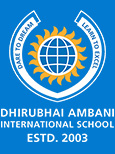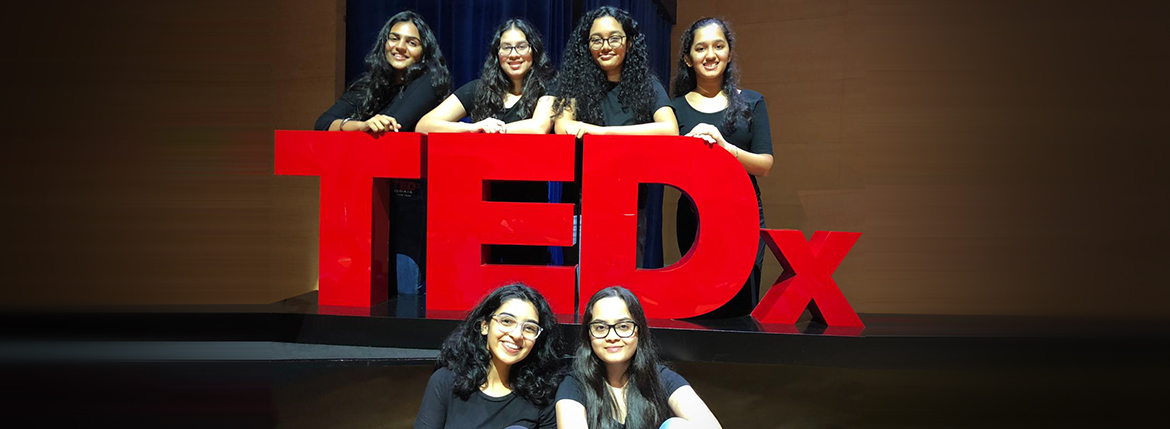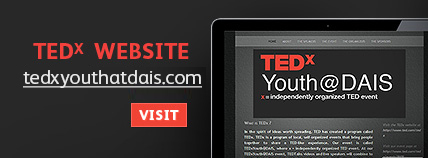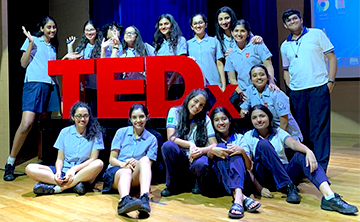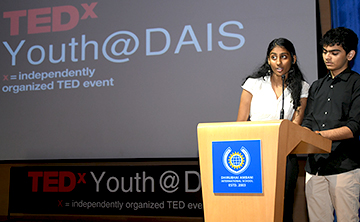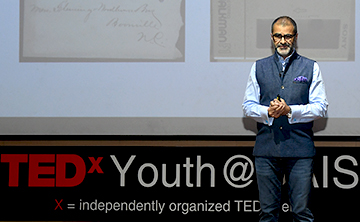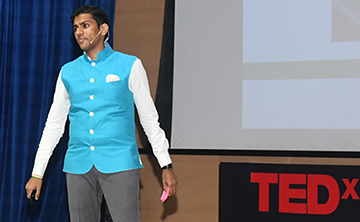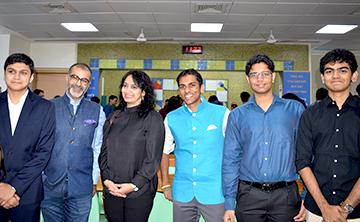TEDxYOUTH@DAIS
2019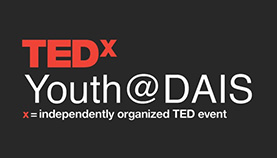
TED is an organization rooted in the principles of ‘Ideas Worth Sharing’; it aims to provide a platform that propagates innovation in diverse fields including technology, education, and design. Over the past few years, this organization has provided us with incredible popular talks such as ‘The Danger of a Single Story’ by Chimamanda Adichie and ‘Inside the Mind of a Master Procrastinator’ by Tim Urban. TEDxYouth@DAIS, born out similar concepts is an independently organized TED event hosted annually in the Dhirubhai Ambani International School Auditorium.
The months leading up to the event comprised of curating speakers, organizing the logistics of the event as well as marketing it. The social media and content creation team initiated a video campaign on Instagram that looked to highlight some of the unique ideas housed within our own school premises.
The TEDxYouth@DAIS 2019 event held on the 19th of October 2019 saw speakers successfully covering diverse fields: art and culture, Ayurveda and entrepreneurship, feminism and the performing arts, history and photography, and technology and politics The morning of the big event day saw a bustling auditorium comprising of enthusiastic students, relatives, and teachers of the school community.
Speaker 1 Mr. Asad Lalljee. Mr. Lalljee has been appointed as the curator of the newly restored Royal Opera House – a major hub of Mumbai’s art and culture. His talk was titled ‘Learning Never Stops Through Culture and the Arts’. Mr. Lalljee skillfully narrated his experiences with varied fields such as marketing and advertisement and how this led to his interactions with the wholly different scenes of art and culture is major metropolitan cities such as Mumbai and New York. Via these interactions, Mr. Lalljee illustrated why Art and Culture should not be an elitist concept and how his initiatives and programs work towards exposing them to the masses. He surely left the audience with a more profound appreciation for lesser-known forms of entertainment such as live music, plays, and other such performances.
Our next speaker was Mr. Arjun Vaidya, an alumnus of our own school. Mr. Vaidya is a 6th generation Vaidya and carries on the 150-year family legacy of Ayurveda. He is a talented entrepreneur who has been featured on the Forbes 30 under 40 list in 2019. He believes that Ayurveda is an essential practice with underestimated benefits. His business-oriented talk conveyed the ways in which he has taken his family business – Dr. Vaidya’s Ayurveda – and modernized it to suit the transformed lifestyles, needs, and demands of a new-age context. Thus, by introducing aspects such as an Ayurvedic hangover pill, Mr. Vaidya conveys his company has now become India’s largest digital Ayurveda barnd. His talk ended leaving the audience pondering over the fact that technological shifts do not neccesarily disadvantage age-old practices.
Will Stephen’s “How to sound smart in your TEDx Talk”, which examined the role of body language and emotion on how to effectively present ideas in a humorous parody of a TED talk.
Our next speaker was Ms. Anuja Ghosalkar. Ms. Ghosalkar is a Bangalore-based theater artist. She is the founder of Drama Queen – a documentary theater company that focusses on personal histories and archival absences. Her talk was titled ‘Why We Need to Know Who Anonymous Was’. The talk began with a thought-provoking introspection on our lack of knowledge of the names of successful women in several. In her talk, she described her experiences in the Indian performing arts circuits and eloquently pointed out the inherently patriarchal systems that exist within it. The talk, however, ended on a positive note as women in the audience were encouraged to shout out their names – metaphorically expressing her proposal to make an active effort towards knowing the anonymous names of the past and the present, many being female.
Our next speaker was Bilal Moin, a student of our school from Grade 12. Bilal is a published poet and a keen reader of literature and history – economic, political, and socio-cultural. His talk was called ‘The Past in Snapshots: Challenging History Through Photography’. In his talk, Bilal employed an engaging story-like narrative wherein he presented the audience with less-known historical pictures, asked them to guess where or when they may have been taken, and often broke their pre-conceived notions. Through this and case studies such as the Tiananmen Square Massacre of 1989, Bilal explored how historical photography (or sometimes our lack of it) provides profound insights of international history, despite its apparent lack of concrete date or written information.
Next, we screened Hans Rosling’s analysis of trends of the growing world population in the talk “Religions and babies.” A Swedish physician and academic, Rosling explores how data can represent economic development and its multiple facets over the last few decades. Through his explanation of the impact of religion on world population, using a continent-by-continent evaluation, Rosling gives a brief understanding into how world development will change in the future.
Our final speaker for the day was Arnav Tawakley, another student of Grade 12 from our school. His talk covered the myriad roles played by technology in our current democratic systems, more specifically within voting and election processes. He provided an insightful talk which included technology’s role: in the insurance of secure voting systems, in the encouragement of grassroots movement through efficient fundraising and outreach, in the curbing of unjust censorship, in the mobilization of protests and activism, in the increase of accountability for world leaders, and in the accuracy of opinion polling systems.
Core Team
Keya Shah, Kashish Shah, Anoushka Kasliwal, Ishaana Khanna, and Apurva Bhandari
Heads
Anushka Basu and Hitanshi Badani
(If you missed out on the event, you will be able to see photographs and the actual TEDxYouth@DAIS talks that will be shared very soon! Keep yourself updated by following and liking our social media sites:
https://www.ted.com/tedx/events/34616
https://instagram.com/tedxyouthdais2020?igshid=1x6pgtmwbaozd
